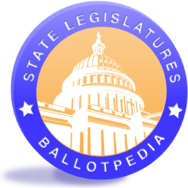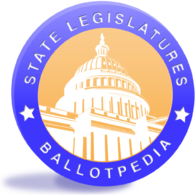Your feedback ensures we stay focused on the facts that matter to you most—take our survey.
2018 Mississippi legislative session
 |
| 2018 legislative sessions coverage |
|---|
| Mississippi State Legislature | |
 | |
| General information | |
| Type: | State legislature |
| Term limits: | None |
| Session start: | January 2, 2018 |
| Session end: | March 28, 2018 |
| Website: | Official Legislature Page |
| Leadership | |
| Senate President: | Tate Reeves (R) |
| House Speaker: | Philip Gunn (R) |
| Structure | |
| Members: | 52 (Senate), 122 (House) |
| Length of term: | 4 years (Senate), 4 years (House) |
| Authority: | Art V, Mississippi Constitution |
| Salary: | $10,000/year + per diem |
| Elections | |
| Redistricting: | Mississippi Legislature has control |
During 2018, Ballotpedia tracked notable stories from the Mississippi State Legislature. The timeline on this page shows the major events that we tracked during 2018, including events in the regular session and in any special sessions that occurred after the regular session adjourned.
If you know of any additional events that should be added to this page, please email us at editor@ballotpedia.org.
Overview
In 2018, the Mississippi State Legislature was in session from January 2, 2018, through March 28, 2018. Lawmakers held a special session from August 23, 2018, to August 29, 2018.
Partisan control
Mississippi was one of 26 Republican state government trifectas in 2018. A state government trifecta occurs when one political party holds the governor's office, a majority in the state Senate, and a majority in the state House. For more information about state government trifectas, click here.
The following tables show the partisan breakdown of the Mississippi State Legislature in the 2018 legislative session.
Senate
| Party | As of July 2018 | |
|---|---|---|
| Democratic Party | 19 | |
| Republican Party | 33 | |
| Vacancies | 0 | |
| Total | 52 | |
House
| Party | As of July 2018 | |
|---|---|---|
| Democratic Party | 47 | |
| Republican Party | 73 | |
| Vacancies | 2 | |
| Total | 122 | |
Leadership in 2018
Senate
- Senate president: Tate Reeves (R)
- President pro tem: Terry Burton (R)
House
- House speaker: Philip Gunn (R)
Status of legislation
| Status of legislation: Regular session | |||
|---|---|---|---|
| Legislation | Subject area | Actions during the regular session | Status at the end of the regular session |
| HB 1510 | Ban most abortions after 15 weeks of pregnancy | Passed House Passed Senate Governor signed |
Permanently blocked by federal court |
| Status of legislation: Special session | |||
| Legislation | Subject area | Actions during the special session | Status at the end of the special session |
| SB 2001 | Create a state lottery | Passed Senate Passed House |
Governor signed |
| HB 1 | Infrastructure act | Passed House Passed Senate |
Governor signed |
Regular session
Regular session bill statistics
| House | Senate | Total | |
|---|---|---|---|
| Introduced | 1071 | 1088 | 2159 |
| Passed both chambers | 190 | 169 | 359 |
| Governor signed | 169 | 155 | 324 |
| Became law without governor's signature | 5 | 0 | 5 |
| Govenor vetoed | 2 | 2 | 4 |
March 6, 2018
Abortion-related bill passes Mississippi Senate
The Mississippi State Senate approved HB 1510, a bill proposing to ban abortions 15 weeks after a pregnant woman's last menstrual cycle, except in a medical emergency or in cases of severe fetal abnormality. The bill proposed requiring healthcare providers who perform an abortion after the 15-week period to report information to the state health department, including a statement that the abortion was necessary to preserve the life of the mother, and an indication of any probable health consequences resulting from the procedure.[1]
The state Senate voted 35 to 14 to pass the measure, which advanced from the House, 80 to 31, on February 2.[2] Read more here.
- Update: Gov. Bryant signed the legislation on March 19. A federal court judge permanently blocked the legislation on November 20.
March 19, 2018
Gov. Bryant signs abortion-related legislation
Gov. Phil Bryant (R) signed House Bill 1510 into law. HB 1510 proposed prohibiting an abortion after 15 weeks of pregnancy "except in a medical emergency and in cases of severe fetal abnormality." It proposed requiring healthcare providers who perform an abortion after 15 weeks of pregnancy to submit a report indicating the date and method of the procedure and the probable age of the fetus, a statement declaring that the procedure was necessary to preserve the life of the mother, and a list of potential health consequences that could result from the procedure. Penalties for performing an illegal abortion included loss of medical license and a $500 fine per violation.[3]
The bill passed the Mississippi House of Representatives on February 2 by an 80-31 vote and the Mississippi State Senate on March 6 by a 35-14 vote. The House agreed to Senate amendments on March 8, 76 to 34.[4]
Gov. Bryant tweeted after signing the bill, "I am committed to making Mississippi the safest place in America for an unborn child, and this bill will help us achieve that goal."[5] The Jackson Women's Health Organization, the only clinic in the state to perform abortions, immediately filed a lawsuit challenging HB 1510. Click here for more information about the lawsuit.
- Update: A federal court judge permanently blocked the legislation on November 20.
Special session: August 23 to August 29
Gov. Phil Bryant (R) called for a special session from August 23, 2018, to August 29, 2018, to discuss legislation related to infrastructure and a statewide lottery.[6]
Senate Bill 2001
August 23, 2018: State Senate passes bill creating state lottery
The Mississippi State Senate voted 30-20 on Senate Bill 2001 (SB 2001), which would create a state lottery. The lottery would be governed by a five-member, governor-appointed board. Funds from the lottery would be earmarked for state highways for 10 years. Transportation Committee Chairman Willie Simmons (D) estimated the lottery would bring in $40 million in its first year and $80 million in subsequent years.
Supporters of SB 2001 cited public support for the lottery and said the state needed funds for infrastructure. Opponents of the bill questioned the powers of the governing board, which would not be subject to the state's bid laws, open records laws, and open meetings laws, and argued that the money would be shifted to purposes other than infrastructure.[7]
August 24, 2018: House amends lottery bill
The Mississippi House of Representatives voted 71-43 to amend SB 2001. The amended version would earmark funds over $80 million per year for the state's pre-K program, rather than infrastructure. It would also require the newly-created state Gaming Corporation to abide by state public records laws and would allow lottery video terminals.[8]
The House kept Senate-version provisions for a five-member, governor-appointed board that would be exempt from the state's bid laws.[8]
The bill was sent to the Senate for a concurrence vote.[8]
August 27, 2018: Senate does not concur with House amendments
The state Senate did not concur with House amendments to SB 2001. The bill was sent to a conference committee.
The House voted against the conference committee bill on a bipartisan 54-60 yay/nay vote. Legislators disagreed on prohibiting lottery video terminals, which function like slot machines, and earmarking funds.[9]
August 28, 2018: Legislature adopts lottery legislation
The legislature sent a conference committee bill to Gov. Phil Bryant (R). The final version directed revenue to infrastructure for the first 10 years of the lottery and earmarked any funds over $80 million for public education. It also prohibited video lottery terminals, machines that operate like slot machines in casinos. The legislation also created a seven-member, governor-appointed board subject to state audit and public records laws.[10]
August 30, 2018: Gov. Phil Bryant (R) signed SB 2001.
House Bill 1
August 23, 2018: State House approves legislation on infrastructure funding mechanisms
The Mississippi House of Representatives approved House Bill 1 (HB 1), 108-5. HB 1 would provide funds for cities and counties from online sales tax revenue, authorize the state to borrow $300 million for an emergency bridge repair fund, designate sports betting revenue to state highways for 10 years, and establish an annual $75 tax on hybrid vehicles and $150 on electric vehicles.[7]
House leaders estimated the legislation would result in $110 million per year for municipalities by 2022. To receive the funds, cities and counties would have to maintain 2018 infrastructure spending levels in later years.[7]
August 24, 2018: Senate adopts infrastructure legislation
The Mississippi State Senate approved HB 1 with amendments. The Senate version would review a city's infrastructure spending for the previous five years, rather than the House's proposed 10 years, to determine the amount of allocated state funds.[8]
August 27, 2018: The House agreed to Senate amendments.
August 28, 2018: Gov. Phil Bryant (R) signed HB 1.
Noteworthy events
On November 20, 2018, U.S. District Judge Carlton W. Reeves permanently blocked HB 1510, ruling the legislation "is a facially unconstitutional ban on abortions prior to viability." He wrote, "The defendants; their officers, agents, servants, employees, and attorneys; and all other persons who are in active concert or participation with them; shall not enforce H.B. 1510 at any point, ever."[11] Click here to read the full ruling.
HB 1510 prohibited most abortion procedures after 15 weeks of pregnancy. The Jackson Women's Health Organization, the sole clinic in the state that performs abortions, filed a lawsuit against the Mississippi Department of Health Officer Mary Currier and the state board of medical licensure after Gov. Phil Bryant (R) signed HB 1510 into law.[12]
In the complaint, the clinic argued:
| “ | Under decades of United States Supreme Court precedent, the State of Mississippi cannot ban abortion prior to viability, regardless of what exceptions are provided to the ban. Accordingly, the ban is unconstitutional as applied to all women seeking pre-viability abortions after 15 weeks.[13] | ” |
In March 2018, Bryant argued, "House Bill 1510 protects maternal health and will further our efforts to make Mississippi the safest place in America for an unborn child. We are confident in its constitutionality and look forward to vigorously defending it."[14] In his November 20 ruling, Reeves wrote that "the Mississippi Legislature's professed interest in 'women's health' is pure gaslighting."[11]
Nancy Northup, president and CEO of the Center for Reproductive Rights, which represented the Jackson Women's Health Organization, said the ruling was a "wake-up call for state lawmakers who are continuously trying to chip away at abortion access."[15]
In December 2019, the Fifth Circuit Court of Appeals upheld Reeves' decision to block HB 1510. Judge Patrick Higginbotham wrote in the ruling, "The law at issue is a ban. Thus, we affirm the district court's invalidation of the law."[16]
Budget
2018
XOnce the budget has passed, add a sentence about it, i.e. The state budget passed on July 1, 2018.
If the state does a biennial budget and passed one in 2017 (i.e. Connecticut), explain that here.X
XAdd any templates related to budget conflicts in 2018X
Process
XAdd information from the chamber overview page about the budget process. Should be a template and easy to addX -->
Legislatively referred constitutional amendments
In every state but Delaware, voter approval is required to enact a constitutional amendment. In each state, the legislature has a process for referring constitutional amendments before voters. In 18 states, initiated constitutional amendments can be put on the ballot through a signature petition drive. There are also many other types of statewide measures.
The methods by which the Mississippi Constitution can be amended:
Note on Mississippi:
Mississippi has an initiated constitutional amendment process, including a signature distribution requirement based on five congressional districts. However, the requirements cannot be met, according to the Mississippi Supreme Court, because the state has four congressional districts following reapportionment in 2001. As a result, the process remains part of the state constitution but cannot be carried out in practice.[17]
| Mississippi Constitution |
|---|

|
| Preamble |
| Articles |
| 1 • 2 • 3 • 4 • 5 • 6 • 7 • 8 • 9 • 10 • 11 • 12 • 13 • 14 • 15 |
The Mississippi Constitution provides two mechanisms for amending the state's constitution—a citizen-initiated process and a legislative process. Mississippi requires a simple majority vote (50% plus 1) for voters to approve constitutional amendments.
Initiative
- See also: Initiated constitutional amendment
An indirect initiated constitutional amendment is a citizen-initiated ballot measure that amends a state's constitution. There are two states – Massachusetts and Mississippi – that allow citizens to initiate indirect constitutional amendments.
While a direct initiated constitutional amendment is placed on the ballot once supporters file the required number of valid signatures, an indirect initiated constitutional amendment is first presented to the state legislature, which has various options depending on the state.
In Mississippi, the number of signatures required for an initiated constitutional amendment is equal to at least 12% of the total number of votes cast for governor in the last gubernatorial general election immediately preceding the signature deadline—not necessarily the gubernatorial election immediately preceding the targeted election date. A simple majority vote is required for voter approval.
Beginning with the day the sponsor receives the ballot title and summary, proponents have one year to circulate petitions and receive certification from the county circuit clerks. Signatures must be submitted to the secretary of state at least 90 days prior to the beginning of the regular session—which begins in the first week of January.
Once it is determined that proponents of a measure have collected enough signatures, the measure is filed with the Mississippi State Legislature on the first day of the legislative session. The legislature must act on the measure within four months of that date. The legislature may choose to adopt the measure by a majority vote in each house. Whether the legislature adopts or rejects the measure, the proposed amendment proceeds to the ballot. The legislature may also choose to approve an amended alternate version of the measure. In this case, both measures appear on the ballot together.
An initiative must receive a majority of the total votes cast for that particular initiative and must also receive more than 40% of the total votes cast in that election.
Note on Mississippi:
Mississippi has an initiated constitutional amendment process, including a signature distribution requirement based on five congressional districts. However, the requirements cannot be met, according to the Mississippi Supreme Court, because the state has four congressional districts following reapportionment in 2001. As a result, the process remains part of the state constitution but cannot be carried out in practice.[18]
Legislature
A two-thirds (66.67%) vote is required during one legislative session for the Mississippi State Legislature to place a constitutional amendment on the ballot. That amounts to a minimum of 77 votes in the Mississippi House of Representatives and 35 votes in the Mississippi State Senate, assuming no vacancies. The absolute number of those voting in favor must be equal to at least a majority of the members elected to each house. Amendments do not require the governor's signature to be referred to the ballot.
See also
| Elections | Mississippi State Government | State Legislatures | State Politics |
|---|---|---|---|
 |
 |
 |
 |
External links
Footnotes
- ↑ Mississippi Legislature, 2018 Regular Session, "House Bill 1510," accessed March 7, 2018
- ↑ Bloomberg, "Mississippi Senate Approves 15-Week Abortion Ban, Earliest in U.S.," March 6, 2018
- ↑ Mississippi Legislature, "House Bill 1510: Bill text approved by the governor," accessed March 27, 2018
- ↑ Mississippi Legislature, "House Bill 1510," accessed March 27, 2018
- ↑ Twitter, "Phil Bryant on March 19, 2018," accessed March 27, 2018
- ↑ WMCActionNews5.com, "Governor issues call for Legislative special session," August 22, 2018
- ↑ 7.0 7.1 7.2 U.S. News & World Report, "Lottery and Aid to Localities Advance in Special Session," August 23, 2018
- ↑ 8.0 8.1 8.2 8.3 Clarion Ledger, "House strips secrecy from lottery bill, Legislature goes home until Monday," August 24, 2018
- ↑ Clarion Ledger, "House shoots down lottery bill, local roads bill goes to governor," August 27, 2018
- ↑ Clarion Ledger, "Special session: Here's what happened," August 29, 2018
- ↑ 11.0 11.1 United States District Court for the Southern District of Mississippi, Jackson Woman's Health Organization v. Currier, November 20, 2018
- ↑ United States District Court for the Southern District of Mississippi, Jackson Women's Health Organization v. Mary Currier and Mississippi State Board of Medical Licensure, March 19, 2018
- ↑ Note: This text is quoted verbatim from the original source. Any inconsistencies are attributable to the original source.
- ↑ Reuters, "Mississippi's new law restricting abortion blocked by judge for 10 days," March 20, 2018
- ↑ Rewire News, "Judge Blocks Mississippi’s 15-Week Abortion Ban, Rips State’s GOP Legislature," November 21, 2018
- ↑ CNN, "Court strikes down Mississippi 15-week abortion ban," December 14, 2019
- ↑ Mississippi Supreme Court, "In Re Initiative Measure No. 65: Mayor Mary Hawkins Butler V Michael Watson, in His Official Capacity as Secretary of State for the State of Mississippi," May 14, 2021
- ↑ Mississippi Supreme Court, "In Re Initiative Measure No. 65: Mayor Mary Hawkins Butler V Michael Watson, in His Official Capacity as Secretary of State for the State of Mississippi," May 14, 2021
